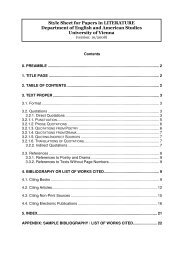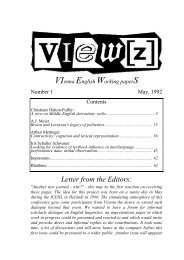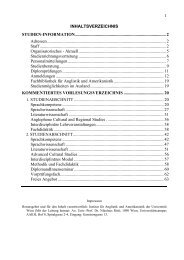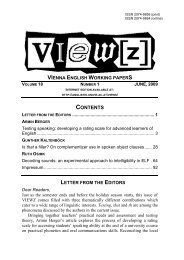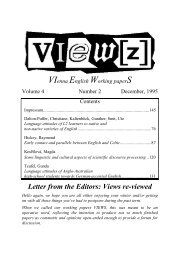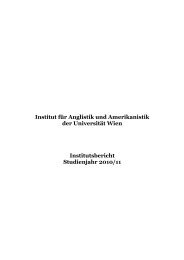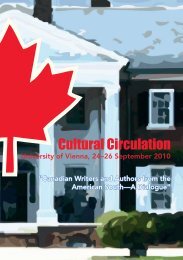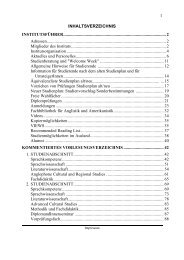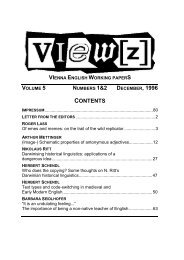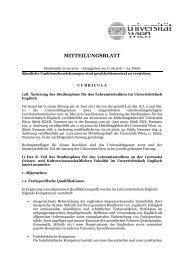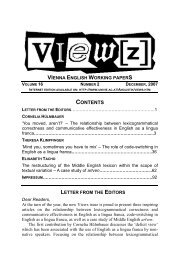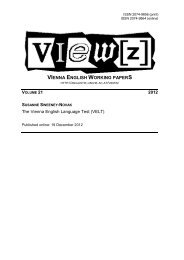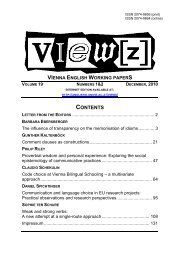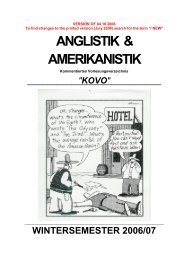1 INHALTSVERZEICHNIS STUDIEN-INFORMATION ...
1 INHALTSVERZEICHNIS STUDIEN-INFORMATION ...
1 INHALTSVERZEICHNIS STUDIEN-INFORMATION ...
Create successful ePaper yourself
Turn your PDF publications into a flip-book with our unique Google optimized e-Paper software.
eduction to re-production and the generation of a system where man is lifted to<br />
transcendent/god-like status while woman is denied autonomy and participation. The texts<br />
envision as the outcome doubled & distorted bodies, psyches, genealogies and a destruction of a<br />
heterosexual ethics.<br />
A variety of myths and images will be introduced to help students to find access to the complex<br />
theoretical argumentation. (Pandora, Pallas-Athena, Alcestis, Echo& Narcissus, Orpheus &<br />
Eurydice, Ariadne & Theseus)<br />
The following texts will be discussed and analysed:<br />
John Milton. Paradise Lost. (1667) (Excerpts); Mary Shelley. Frankenstein. (1818); Djuna<br />
Barnes. Nightwood (1936); Emily Bronte. Wuthering Heights. (1848); Angela Carter. The<br />
Passion of New Eve. (1977)<br />
Tracing the topic in the 1990’s we will also analyse two very different films: David Fincher’s<br />
“Fight Club” and Elisabeth Bronfen’s critique; Stephen Spielberg’s “A.I.” which we will crossread<br />
with Irigaray’s essay “Une Mère de Glace”.<br />
A reader with excerpts of feminist theoretical texts & myths dealt with will be provided.<br />
For further information see: http://homepage.univie.ac.at/melanie.feratova-loidolt<br />
Requirements: regular attendance & portfolio-notes, participation in critical discussions, oral<br />
presentation of a chosen topic (10 mins), final written exam.<br />
39<br />
Gender Equality: Problems and Perspectives<br />
Ayesha Landesmann-Aibara, Thu 17-19, Unterrichtsraum (ab 10.3.)<br />
Registration see p. 15 (16)<br />
The aim of the course is to look at the ways in which the issue of gender relations is implicated<br />
in the often varying and sometimes conflicting views held by the ‘West’ and the ‘non-West’ on<br />
questions of culture, religion, tradition, progress, modernisation and “westernization”.<br />
The course takes the case of India as a starting point to discuss specific issues related to two<br />
main themes: the idea of measuring social progress in terms of the status of women and the<br />
attempts to achieve gender equality within a pluralistic democratic society. In particular, we will<br />
look at the problems inherent in reconciling the conflicting claims of the religious and the<br />
secular, poverty and economic development, as well as the debate over positive discrimination.<br />
Approaching ESP Texts<br />
2st, KO<br />
Julia Hüttner, Thu 15-17, Room 5 (ab 10.3.)<br />
Registration see p. 15 (16)<br />
In this interactive course, we will focus on ESP texts of different kinds within an applied<br />
linguistic framework. By keeping the overall aim of ESP teaching in mind, we will describe and<br />
analyse the features and structures of a selection of text types, or genres. Apart from a reflective<br />
introduction to discourse and genre analysis, this will also entail learning to use language<br />
corpora, i.e. computerised collections of texts, and the associated concordancing software. This<br />
course aims to show students how to access and work with text sources as an aid in using and<br />
developing teaching materials.<br />
This course falls into three parts: introduction to the applied linguistic framework;<br />
practical experience in analysing ESP genres; and student projects on specific language aspects<br />
of an ESP genre and how they could be taught.



